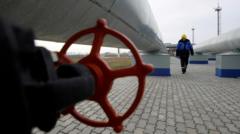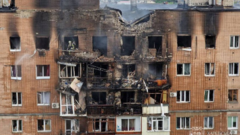With an ongoing conflict, the move raises energy security concerns for neighboring countries.
**Ukraine Ceases Russian Gas Transit, Sparking Regional Tensions**

**Ukraine Ceases Russian Gas Transit, Sparking Regional Tensions**
Ukrainian President Zelensky ends Russian gas imports to Europe as transit deal expires.
Ukraine's gas transit operations to Europe will conclude on Wednesday, following the expiration of a five-year contract with Russia’s Gazprom. President Volodymyr Zelensky emphasized that Ukraine will no longer allow Russia to profit while its forces occupy Ukrainian land. He urged European Union members to prepare within a year to address the upcoming energy vacuum.
Since Russia initiated its full-scale invasion of Ukraine in 2022, EU imports of Russian gas have dramatically decreased. However, eastern European nations still rely heavily on these supplies. Despite this, the European Commission has assured that the continent's gas infrastructure remains robust and well-equipped to handle the end of Ukrainian transit.
In 2023, Russian gas accounted for less than 10% of EU imports, a stark decline from the 40% market share in 2021. Countries such as Slovakia and Austria continue to receive significant amounts of Russian gas, which has triggered an immediate diplomatic crisis. Slovakia has emerged as the primary entry point for Russian gas into the EU, charging transit fees for supplies headed to Austria, Hungary, and Italy. Following a controversial meeting between Slovakia's Prime Minister Robert Fico and Russian President Vladimir Putin, tensions escalated, with Fico threatening to cut off electricity supplies to Ukraine, prompting accusations from Zelensky of collusion with Russian interests.
Poland has extended a helping hand to Ukraine, pledging assistance if Slovakia proceeds with the electricity shutdown, a critical lifeline for Ukraine's war-damaged energy grid. Moldova, a non-EU country, is also facing severe consequences from the end of the transit agreement, as Russian gas fuels a vital power plant that caters to most of its electricity demands. Moldovan President Maia Sandu condemned the Kremlin's tactics, suggesting they are aimed at undermining the nation ahead of its upcoming elections.
Since 1991, Russia has utilized Ukraine as a key transit route for gas to Europe. As reliance on Russian gas diminishes, European countries have secured alternative supplies through liquefied natural gas (LNG) imports from the US and Qatar, plus piped gas from Norway. Consequently, the Black Sea's TurkStream pipeline will become the sole conduit for Russian gas to Europe once the Ukrainian transit ceases.
To address the rapidly shifting energy landscape, the European Commission previously unveiled strategies to replace Ukrainian gas supplies. Contingent plans are in place to source additional gas through Greece, Turkey, Romania, and Poland, while Germany is expected to enhance central Europe’s gas access.
Since Russia initiated its full-scale invasion of Ukraine in 2022, EU imports of Russian gas have dramatically decreased. However, eastern European nations still rely heavily on these supplies. Despite this, the European Commission has assured that the continent's gas infrastructure remains robust and well-equipped to handle the end of Ukrainian transit.
In 2023, Russian gas accounted for less than 10% of EU imports, a stark decline from the 40% market share in 2021. Countries such as Slovakia and Austria continue to receive significant amounts of Russian gas, which has triggered an immediate diplomatic crisis. Slovakia has emerged as the primary entry point for Russian gas into the EU, charging transit fees for supplies headed to Austria, Hungary, and Italy. Following a controversial meeting between Slovakia's Prime Minister Robert Fico and Russian President Vladimir Putin, tensions escalated, with Fico threatening to cut off electricity supplies to Ukraine, prompting accusations from Zelensky of collusion with Russian interests.
Poland has extended a helping hand to Ukraine, pledging assistance if Slovakia proceeds with the electricity shutdown, a critical lifeline for Ukraine's war-damaged energy grid. Moldova, a non-EU country, is also facing severe consequences from the end of the transit agreement, as Russian gas fuels a vital power plant that caters to most of its electricity demands. Moldovan President Maia Sandu condemned the Kremlin's tactics, suggesting they are aimed at undermining the nation ahead of its upcoming elections.
Since 1991, Russia has utilized Ukraine as a key transit route for gas to Europe. As reliance on Russian gas diminishes, European countries have secured alternative supplies through liquefied natural gas (LNG) imports from the US and Qatar, plus piped gas from Norway. Consequently, the Black Sea's TurkStream pipeline will become the sole conduit for Russian gas to Europe once the Ukrainian transit ceases.
To address the rapidly shifting energy landscape, the European Commission previously unveiled strategies to replace Ukrainian gas supplies. Contingent plans are in place to source additional gas through Greece, Turkey, Romania, and Poland, while Germany is expected to enhance central Europe’s gas access.























